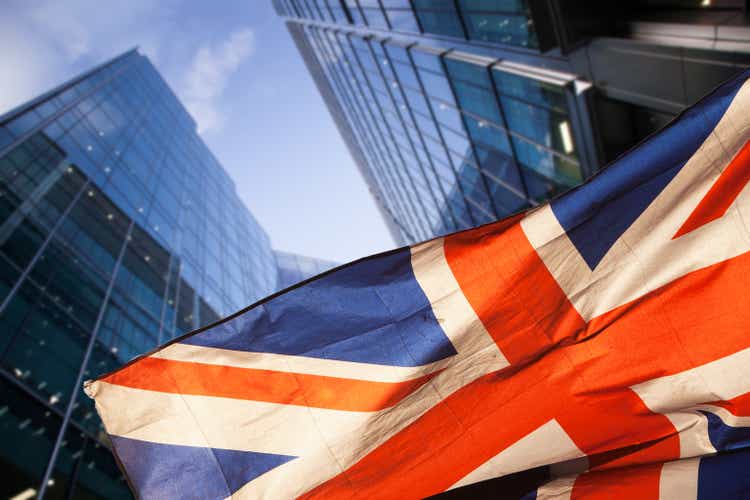melis82/iStock via Getty Images
By William H. Witherell, Ph.D.
Contracting consumer and government spending led to a small 0.1% q/q decline in the United Kingdom’s GDP in the second quarter. Consumers were facing an increasing squeeze on their real incomes because of inflation. Government health spending was reduced by the ending of the coronavirus test and trace program. As this decline followed a 0.8% q/q gain in the first quarter, economic momentum clearly is weakening. Views differ on whether a slight positive gain can be achieved in the third quarter, with booming travel services being one positive development. Further ahead, the outlook is both darker and highly uncertain. The Bank of England is projecting the UK economy to experience negative growth and enter a recession that begins in the fourth quarter of this year and continues through the end of 2023. This implies a decline of 1.4% y/y in 2023. The economic policy outlook, with a new prime minister to be chosen on September 5, is an important unknown. Fiscal policy actions could lead to a recovery in the economy during 2023. Other sources of uncertainty are future developments in the Russia-Ukraine war, the Covid pandemic, Brexit, and the external economy.
The main headwinds going forward are caused by sharply rising energy bills driven by soaring gas prices. Since Britain was importing only a small proportion of its gas from Russia, one might have thought it would not be strongly affected by Russia’s gas supply curbs. However, Britain is connected by a gas pipeline to Europe, and the prices Britain pays are closely related to European gas prices. Also, a greater proportion of homes in England than in Europe are heated by gas or gas-generated electricity. Britain has an energy price cap that regulates the maximum that suppliers can charge most of the country’s households. The cap was designed to limit excess profit margins for suppliers but not to prevent higher prices. The cap is now being recalculated every three months. Wholesale gas prices last week were 40% higher than a month ago and almost double the level in January. The cap may be increased by nearly 60% to £3,135 in October, and a further increase in January is very likely. A higher cap will intensify the cost-of-living crisis, particularly for the most vulnerable households. A policy response will be needed.
At the same time, the Bank of England (BOE) is giving priority to combating inflation. This choice is understandable. UK consumer price inflation reached a 40-year high of 9.4% in June and may exceed 10% by October. Real disposable income is falling this year and looks likely to decline further in 2023, when inflation may remain at a still-high 6%. The BOE surprised the market with a 50-bp rise in August and stepped up the projected pace of further rate hikes. It also plans to begin quantitative tightening through government bond (gilt) sales in September. One should not expect the BOE to take its foot off the brakes anytime soon.
The polls predict that the foreign secretary, Liz Truss, will win the Conservative Party leadership on September 5 and become the next prime minister, replacing Boris Johnson. Her greatest immediate challenge will be the developing cost-of-living crisis as real incomes tumble. She has promised an emergency budget in September. She says she will seek to lower the tax burden, not give out “handouts.” She also says she will do “all I can” to help the most vulnerable. She is surely aware that tax cuts can do little to offset soaring energy bills for the households with the lowest incomes. She has proposed a reversal of the 1.25 percentage point increase in National Insurance contribution rates instituted in April and a reversal of the corporate tax hike from 19% to 25% scheduled for next April, which together would amount to some £30 billion of unfunded tax cuts. These changes could reduce somewhat the severity and duration of the projected recession.
Another challenge facing the new prime minister will be the continuing fallout from Brexit, England’s decision in 2016 to exit the European Union and its subsequent departure from the European single market in December 2020. Truss has indicated she supports enacting the Northern Ireland Protocol Bill, which would have the effect of unilaterally tearing up part of the Brexit deal between the UK and the EU. The EU has indicated that it would retaliate against such a unilateral action by eliminating any British scientists from the very large Horizon research program. This sequence could ignite a trade war that would be damaging to both the UK and EU economies at a time when both will be struggling to recover from a period of weakness. Truss, who once voted Remain but now says she seeks to have Britain become a low-tax, low-regulation “Singapore-on-Thames,” may be able to return to negotiating a solution to the intractable Northern Ireland issues that have bedeviled Brexit from the beginning.
The UK stock market outperformed European stocks earlier in the year, with the FTSE 100 up by 1.58% year-to-date August 12, compared to a decline of 9.62% in the STOXX Europe 600 over this period. However, recently, as prospects for the UK economy began to weaken, the UK market has underperformed Europe’s somewhat. Over the past four weeks, the FTSE 100 gained 4.04% whereas the STOXX Europe 600 gained 5.71%. At Cumberland Advisors, we have maintained relatively small UK positions in our International and Global Equity ETF Portfolios and will be monitoring developments closely.
Sources: Financial Times, The Economist, Oxford Economics, The Week, CNBC.com, Barclays Research
Editor’s Note: The summary bullets for this article were chosen by Seeking Alpha editors.


Be the first to comment